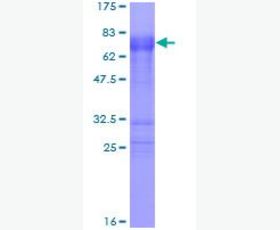Recombinant Human EIF4E-Binding Protein 1/EIF4EBP1
| Product name: | Recombinant Human EIF4E-Binding Protein 1/EIF4EBP1 |
| Source: | E.coli |
| Purity: | Greater than 95% as determined by reducing SDS-PAGE. |
| Buffer Formulation: | Lyophilized from a 0.2 μm filtered solution of 20mM PB, 150mM NaCl, pH 7.4. |
| Applications: | Applications:SDS-PAGE; WB; ELISA; IP. |
| Storage: | Avoid repeated freeze/thaw cycles. Store at 2-8 oC for one month. Aliquot and store at -80 oC for 12 months. |
| UOM: | 100ug/50ug/200ug/1mg/1g |
| Source | E.coli |
| Description | Recombinant Human EIF4E-Binding Protein 1 is produced by our E.coli expression system and the target gene encoding Met1-Ile118 is expressed with a 6His tag at the N-terminus. |
| Names | Eukaryotic Translation Initiation Factor 4E-Binding Protein 1, 4E-BP1, eIF4E-Binding Protein 1, Phosphorylated Heat- and Acid-Stable Protein Regulated by Insulin 1, PHAS-I, EIF4EBP1 |
| Accession # | Q13541 |
| Formulation | Lyophilized from a 0.2 μm filtered solution of 20mM PB, 150mM NaCl, pH 7.4. |
| Shipping |
The product is shipped at ambient temperature. |
| Reconstitution |
Always centrifuge tubes before opening. Do not mix by vortex or pipetting. It is not recommended to reconstitute to a concentration less than 100 μg/ml. Dissolve the lyophilized protein in ddH2O. Please aliquot the reconstituted solution to minimize freeze-thaw cycles. |
| Storage |
Lyophilized protein should be stored at < -20°C, though stable at room temperature for 3 weeks. Reconstituted protein solution can be stored at 4-7°C for 2-7 days. Aliquots of reconstituted samples are stable at < -20°C for 3 months. |
| Purity |
Greater than 95% as determined by reducing SDS-PAGE. |
| Endotoxin | Less than 0.1 ng/µg (1 IEU/µg) as determined by LAL test. |
| Amino Acid Sequence |
MGSSHHHHHHSSGLVPRGSHMSGGSSCSQTPSRAIPATRRVVLGDGVQLPPGDYSTTPGGTLFST TPGGTRIIYDRKFLMECRNSPVTKTPPRDLPTIPGVTSPSSDEPPMEASQSHLRNSPEDKRAGGE ESQFEMDI
|
| Background | Eukaryotic Translation Initiation Factor 4E-Binding Protein 1 (4EBP1) is a number of the eIF4E-binding protein family. 4EBP1 regulates eIF4E activity by preventing its assembly into the eIF4F complex. 4EBP1 mediates the regulation of protein translation by hormones, growth factors and other stimuli that signal through the MAP kinase and mTORC1 pathways. Non-phosphorylated 4EBP1 competes with EIF4G1/EIF4G3 to interact with EIF4E. 4EBP1 is phosphorylated in response to various signals including insulin signaling, resulting in its dissociation from eIF4E and activation of mRNA translation. 4EBP1 has a role in progression of breast neoplasms through cell signaling. |














